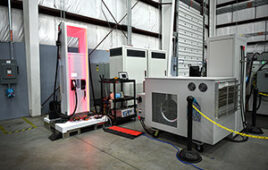NREL Researcher Discusses Revitalized Algae Program
Dr. Philip Pienkos, Principal Research Supervisor at the U.S. Department of Energy’s National Renewable Energy Laboratory (NREL), will discuss NREL’s efforts to rebuild the Aquatic Species Program for algal biofuels research on July 7, from 3-5 p.m., at the University of Minnesota Twin Cities Campus. The presentation is free, open to the public, and will also be broadcast online at http://umconnect.umn.edu/IonE.
NREL has revitalized its algal biofuels research program to investigate microalgae as a cost-effective feedstock for transportation fuel production. NREL researchers pioneered microalgal biofuels development by leading the DOE Aquatic Species Program from 1979 until DOE discontinued funding for the research in 1996, when it appeared that algae-based fuels would be too expensive to compete against petroleum-derived fuels. Today, in response to volatile petroleum prices and an increased national interest in energy security and reducing greenhouse gas emissions, algae has reemerged as a promising biofuels feedstock.
In his presentation, Dr. Pienkos will give an overview of NREL’s integrated algal biofuels program and will highlight results and accomplishments from recent NREL projects, including algal compositional analysis, transcriptomics, proteomics, cell wall deconstruction, and cyanobacteria engineering.
The presentation is sponsored by the University of Minnesota Institute on the Environment’s Initiative for Renewable Energy and the Environment. The session will take place Wednesday, July 7, from 3 -5 p.m. in room R380 IonE Seminar Room Vocational-Technical Education at the University of Minnesota Twin Cities Campus. The presentation will be broadcast live at http://umconnect.umn.edu/IonE. A networking reception will follow the meeting.
Microalgae (microscopic algae) are small, photosynthetic organisms that grow in aquatic environments and use solar energy and carbon dioxide to create biomass more efficiently and rapidly than terrestrial plants. Microalgal biomass is made up of sugars and lipids that can be converted into a variety of advanced transportation fuels, such as biodiesel, gasoline, and jet fuel.
NREL is DOE’s primary national laboratory for renewable energy and energy efficiency research and development. NREL is operated for DOE by The Alliance for Sustainable Energy, LLC.
###
Visit NREL online at www.nrel.gov




